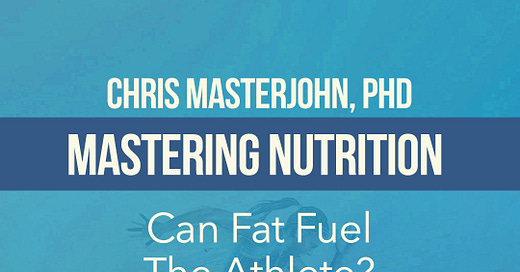Introduction
In this episode, we look at whether fat can fuel the athlete. We begin with the physiological principles involved, then take a look at the evidence from studies swapping fat for carbs to see how it impacts athletic performance.
Show Notes
0:00:42 Cliff Notes
0:08:33 The three systems of energy metabolism in skeletal muscle: phosphagen (creatine phosphate and ATP), anaerobic glycolysis (conversion of glucose to lactate), and oxidative phosphorylation (use of carbohydrate, protein, or fat to produce energy using oxygen).
0:10:11 The different sources of fuel have different proximities to the site of muscular contraction (in declining order: phosphagens, glycolysis using muscular glycogen, aerobic metabolism of glycogen, use of fatty acids from adipose tissue or glucose produced by the liver).
0:12:41 As a result of the different proximities to the site of muscular contraction, the different fuels are used at different rates.
0:16:03 Fat provides an enormous amount of energy, but slowly; glucose supplies are limited, but provide energy rapidly.
0:18:56 After a short period of time at high intensity creatine must be recycled through anaerobic glycolysis or oxidative phosphorylation.
0:20:41 It can take minutes to become aerobic, so after a few seconds of running on creatine you’re dependent on glucose for intensity at least until the aerobic lag is over.
0:28:57 Even when you’re maximally aerobic, pushing your intensity further requires glucose.
0:30:40 The evidence.
0:30:53 Romijn 1993: when eating 3-400 g carb/d, light intensity burns almost 100% fat, high intensity burns mostly carbohydrate, and moderate intensity burns about half fat half carbohydrate.
0:36:34 Phinney 1983: <20 g/d carb does not hurt endurance when the goal is to cycle at least 60 rpm without giving up, but it decimates muscular glycogen and forces adaptations to use less glycogen during moderate intensity exercise.
0:39:27 Volek 2016: Endurance athletes who chose themselves to eat low-carbohydrate diets providing ~82 g/d carbs for at least six months burned less carbohydrate and more fat during a 3-hour moderate intensity treadmill run, but had zero changes to their stores of muscular glycogen or their utilization of glycogen during exercise.
0:46:44 Paoli 2012: A high-protein, possibly “ketogenic” diet (perhaps) with lots of herbal performance enhancers, might not hurt performance if you ignore the effect of weight loss on the difficulty of body weight exercises.
0:54:45 Wilson 2017: Keto does not hurt 1RMs on the bench press or squat or impair gains of muscular circumference, but it wipes out gains on all-out cycling unless you carb load before the test.
0:58:12 Burke 2017: High-carb all the time is the best diet for competitive race walking, even better than periodized training and certainly better than low-carb.
01:04:21 The Lakers went low-carb in 2013 and their performance tanked to an unprecedented level. It’s an historical anecdote and you can’t prove cause and effect. Nevertheless, known physiology strongly favors the view that you can’t win basketball games relying on fat for your peak intensity.
01:11:41 Bottom line: fat can help you go long; if you want to go hard or go fast, get glucose.
Other Posts Related to “Can Fat Fuel the Athlete?”
Carbs and Sports Performance: The Principles | Masterclass With Masterjohn Energy Metabolism Lesson 17
Carbs and Sports Performance: The Evidence | Masterclass With Masterjohn Energy Metabolism Lesson 18
Should You Do CrossFit on a Ketogenic Diet? | Mastering Nutrition Episode 16
Research and Educational Resources Related to “Can Fat Fuel the Athlete?”
For background, Poortmans, Principles of Exercise Biochemistry.
Gastin PB. Energy System Interaction and Relative Contribution During Maximal Exercise. 2001.
Jones and Vanhatalo. The ‘Critical Power’ Concept: Applications to Sports Performance with a Focus on Intermittent High-Intensity Exercise. 2017.
Chidnok,et al. Muscle metabolic responses during high-intensity intermittent exercise measured by 31P-MRS: relationship to the critical power concept. 2013.
Barclay CJ. Energy demand and supply in human skeletal muscle. 2017.
van Hall G. The Physiological Regulation of Skeletal Muscle Fatty Acid Supply and Oxidation During Moderate-Intensity Exercise. 2015.
Romijn et al. Regulation of endogenous fat and carbohydrate metabolism in relation to exercise intensity and duration. 1993.
Phinney et al. The human metabolic response to chronic ketosis without caloric restriction: physical and biochemical adaptation. 1983
Phinney et al. The human metabolic response to chronic ketosis without caloric restriction: preservation of submaximal exercise capability with reduced carbohydrate oxidation. 1983.
Volek et al. Metabolic characteristics of keto-adapted ultra-endurance runners. 2016.
Paoli et al. Ketogenic diet does not affect strength performance in elite artistic gymnasts. 2012.
Wilson et al. The Effects of Ketogenic Dieting on Body Composition, Strength, Power, and Hormonal Profiles in Resistance Training Males. 2017.
Burke et al. Low carbohydrate, high fat diet impairs exercise economy and negates the performance benefit from intensified training in elite race walkers. 2017.
Ken Berger, Nutrition in the NBA Part 1.
NBA Teams: Los Angeles Lakers Records Year by Year.
Read the Transcript or Leave a Comment
Masterpass members have access to the transcript below.
Masterpass members can also read and leave comments below. Non-members can read and leave comments on the general podcast page.
Learn more about the Masterpass here.



